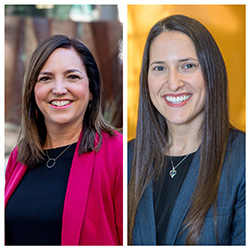Graduate Medical Education Team Awarded $25,000 by the American Medical Association’s Innovation Grant
An interdisciplinary Graduate Medical Education (GME) team — Pooja Rangan, MBBS, MPH, Data and Research Outcomes director for GME, Jennifer Preston, MD, program director for the Integrated Surgical Residency Brian MacArthur, MD, program director for the Obstetrics and Gynecology Residency, and Cheryl O’Malley, MD, vice dean of GME — at the University of Arizona College of Medicine – Phoenix was selected for the American Medical Association’s $25,000 Innovation Grant.

Dr. O’Malley expressed enthusiasm about their selection, as well as about the hopes they have for the framework they have laid out. “For years, medical education has been moving toward competency-based medical education, which focuses on outcomes rather than simply process. We are excited to develop a shared mental model of outcomes for GME programs across specialties and to use AI to display results and connect with resources.” she said.
That framework is one built on the idea of master adaptive learners (MALs). MAL is a model for lifelong learning that emphasizes self-direction and self-regulation in a changing environment. Measuring the success of how a learner adapts is generally done with the creation of various milestones. But Dr. O’Malley and her team want to take that a step further.
They want each individual GME program to also be a MAL. To date, no markers exist to quantitatively assess how a program adapts to what is and what is not working. “They have only been developed for learners, but no sponsoring institutions have defined program competencies and integrated them into program and institutional evaluation,” Dr. O’Malley explained. “We aim to fill that gap by applying MAL principles, the milestones framework and outcome dashboards at the GME program level for continuous quality improvement (CQI).
A team of institutional educational leaders defined six core competencies that apply across all program specialties — faculty teaching, feedback and assessment, patient safety and quality improvement, equity, well-being, and scholarly activity. Within each of those six, there are three sub-competencies that will be tracked, as well.
“So far, we have defined the initial versions of the GME program milestones, mapped existing evaluation tools to the relevant sub-competencies and integrated assessment in each area with the annual program evaluation process,” noted Dr. O’Malley.

She added, “The GME program milestones that we have defined have only been created and vetted by our institution. We envision that this framework can be vetted and adopted nationally to further realize the potential."
As part of their selection, the team was invited to join the AMA ChangeMedEd Consortium. The consortium is committed to developing, implementing and disseminating bold, innovative projects that promote systemic change to better train future physicians. They will join a host of other medical schools with projects focusing on the application of precision education across the medical education continuum, from medical school and residency to continuing medical education.
This is the second time the College of Medicine – Phoenix has received this grant from the AMA. In 2021, the college was recognized for its project Personal Best: A Program to Enhance Emotional Intelligence and Coaching Skills in Graduate Medical Education. This second award further establishes the college’s national reputation for creative approaches to medical education.
About the College
Founded in 2007, the University of Arizona College of Medicine – Phoenix inspires and trains exemplary physicians, scientists and leaders to advance its core missions in education, research, clinical care and service to communities across Arizona. The college’s strength lies in our collaborations and partnerships with clinical affiliates, community organizations and industry sponsors. With our primary affiliate, Banner Health, we are recognized as the premier academic medical center in Phoenix. As an anchor institution of the Phoenix Bioscience Core, the college is home to signature research programs in neurosciences, cardiopulmonary diseases, immunology, informatics and metabolism. These focus areas uniquely position us to drive biomedical research and bolster economic development in the region.
As an urban institution with strong roots in rural and tribal health, the college has graduated more than 1,000 physicians and matriculates 130 students each year. Greater than 60% of matriculating students are from Arizona and many continue training at our GME sponsored residency programs, ultimately pursuing local academic and community-based opportunities. While our traditional four-year program continues to thrive, we will launch our recently approved accelerated three-year medical student curriculum with exclusive focus on primary care. This program is designed to further enhance workforce retention needs across Arizona.
The college has embarked on our strategic plan for 2025 to 2030. Learn more.